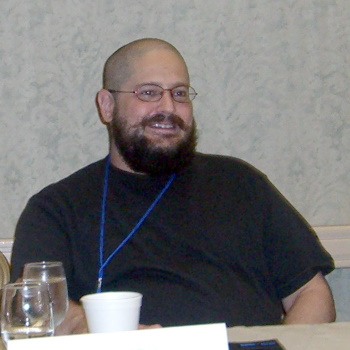On January 23, 2007 the FACT reading group discussed "Accelerando" by Charles Stross. Here are the main observations made at the discussion. These links lead to the full write-up of the discussion on my SFragments website.
"Accelerando" is too discontinuous to be called a novel. The stories that make up "Accelerando" revolve around the same set of characters, but there is no plot arch to unify them. That can be a good thing, too. The characterization was mediocre. But it was offset by innovative ideas, which "Accelerando" is chockfull of. The readers were most impressed by: Charles Stross' portrayal of the technological Singularity; his answer to the Fermi paradox; his humorous treatment of lawyers, spam, pyramid schemes and other life's small annoyances.
Charles Stross in the "Current Trends in British SF" panel at ArmadilloCon 2007Some people thought that parts of Stross' futuristic vision were too sketchy. Especially Economics 2.0, which, many readers agreed, was explained in no more than a hand-waving fashion.
Everybody acknowledged that this book is not for mass audiences. Its extremely high "geek quotient" prompted comments such as these:
-- It definitely is rapture of the nerds.
-- You have to have a background in sciene fiction to understand it. Mainstream book clubs shouldn't read it. Stross is not pandering. Well, he's pandering to a geek audience. If you're not reading science fiction and you're not getting any of this, he doesn't care.
-- It's definitely written for a SF computer nerd. Specifically, computer science SF nerd. 90% of reference he makes are computer science references that's he's playing around.
Somebody also observed that despite being set in the future, Accelerando is very closely tied to today's technological and pop-culture landscape: "I'm not sure you can understand if you don't read Dilbert and Slashdot. I'm not sure if a bright person who's not from that community would understand it." Which may be seen as a drawback for this book, as it unnecessarily narrows down the audience that might be able to enjoy it otherwise. For the same reason the book may not age well, as in 20 years Dilbert references may be obsolete.





No comments:
Post a Comment